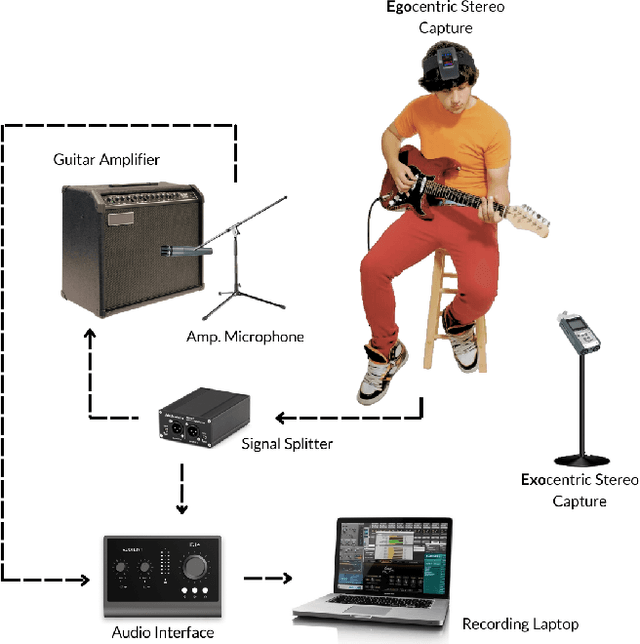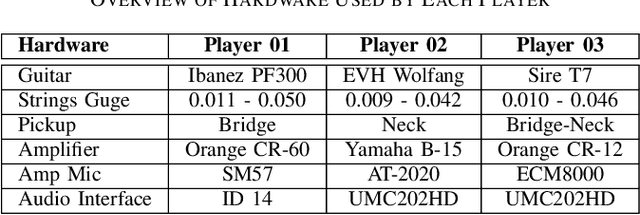Wallace Abreu
Guitar-TECHS: An Electric Guitar Dataset Covering Techniques, Musical Excerpts, Chords and Scales Using a Diverse Array of Hardware
Jan 07, 2025



Abstract:Guitar-related machine listening research involves tasks like timbre transfer, performance generation, and automatic transcription. However, small datasets often limit model robustness due to insufficient acoustic diversity and musical content. To address these issues, we introduce Guitar-TECHS, a comprehensive dataset featuring a variety of guitar techniques, musical excerpts, chords, and scales. These elements are performed by diverse musicians across various recording settings. Guitar-TECHS incorporates recordings from two stereo microphones: an egocentric microphone positioned on the performer's head and an exocentric microphone placed in front of the performer. It also includes direct input recordings and microphoned amplifier outputs, offering a wide spectrum of audio inputs and recording qualities. All signals and MIDI labels are properly synchronized. Its multi-perspective and multi-modal content makes Guitar-TECHS a valuable resource for advancing data-driven guitar research, and to develop robust guitar listening algorithms. We provide empirical data to demonstrate the dataset's effectiveness in training robust models for Guitar Tablature Transcription.
AEROMamba: An efficient architecture for audio super-resolution using generative adversarial networks and state space models
Nov 11, 2024



Abstract:Audio super-resolution aims to enhance low-resolution signals by creating high-frequency content. In this work, we modify the architecture of AERO (a state-of-the-art system for this task) for music super-resolution. SPecifically, we replace its original Attention and LSTM layers with Mamba, a State Space Model (SSM), across all network layers. Mamba is capable of effectively substituting the mentioned modules, as it offers a mechanism similar to that of Attention while also functioning as a recurrent network. With the proposed AEROMamba, training requires 2-4x less GPU memory, since Mamba exploits the convolutional formulation and leverages GPU memory hierarchy. Additionally, during inference, Mamba operates in constant memory due to recurrence, avoiding memory growth associated with Attention. This results in a 14x speed improvement using 5x less GPU. Subjective listening tests (0 to 100 scale) show that the proposed model surpasses the AERO model. In the MUSDB dataset, degraded signals scored 38.22, while AERO and AEROMamba scored 60.03 and 66.74, respectively. For the PianoEval dataset, scores were 72.92 for degraded signals, 76.89 for AERO, and 84.41 for AEROMamba.
 Add to Chrome
Add to Chrome Add to Firefox
Add to Firefox Add to Edge
Add to Edge